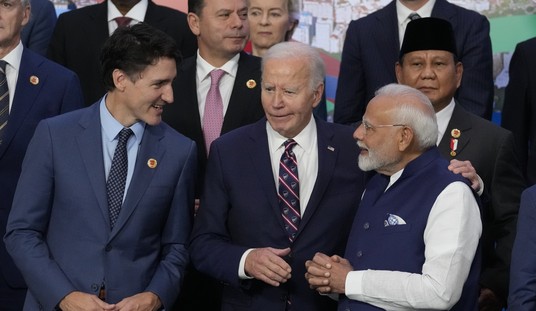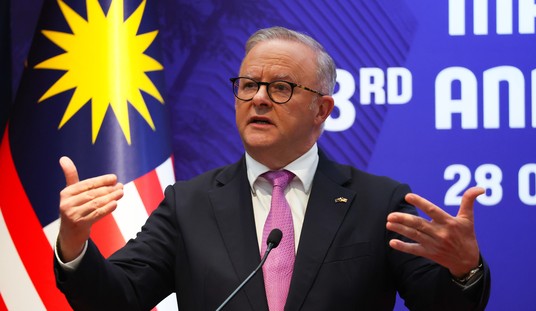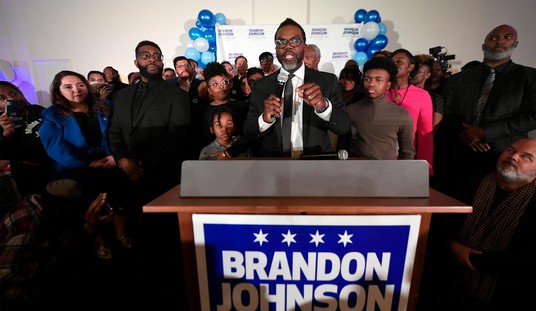Everyone in the blogosphere’s going to be linking this Thomas P.M. Barnett profile in Esquire published just last week suggesting that Fallon’s the only thing standing between the U.S. and war with Iran, and as such, if he leaves Centcom it’s a surefire sign that he’s lost the debate and the bombs will soon be dropping. Well, he’s out. Read the Esquire piece while I go look for updates.
Allegedly he isn’t a big fan of Petraeus either, so bear that angle in mind too as explanations emerge. Stand by.
Update: From WaPo’s write-up of the Esquire article:
As he was preparing to take command, Fallon said that a war with Iran “isn’t going to happen on my watch,” according to retired Army Col. Patrick Lang.
Lang, a former analyst with the Defense Intelligence Agency, said in an interview that he asked Fallon how he would avoid such a conflict. “I have options, you know,” Fallon responded, which Lang interpreted as implying Fallon would step down rather than follow orders he considers mistaken.
Update: A key passage from Esquire. Bear in mind, we’ve been hearing rumors from the likes of Seymour Hersh about the “imminent” attack on Iran for two years:
Just as Fallon took over Centcom last spring, the White House was putting itself on a war footing with Iran. Almost instantly, Fallon began to calmly push back against what he saw as an ill-advised action. Over the course of 2007, Fallon’s statements in the press grew increasingly dismissive of the possibility of war, creating serious friction with the White House.
Last December, when the National Intelligence Estimate downgraded the immediate nuclear threat from Iran, it seemed as if Fallon’s caution was justified. But still, well-placed observers now say that it will come as no surprise if Fallon is relieved of his command before his time is up next spring, maybe as early as this summer, in favor of a commander the White House considers to be more pliable. If that were to happen, it may well mean that the president and vice-president intend to take military action against Iran before the end of this year and don’t want a commander standing in their way.
And so Fallon, the good cop, may soon be unemployed because he’s doing what a generation of young officers in the U. S. military are now openly complaining that their leaders didn’t do on their behalf in the run-up to the war in Iraq: He’s standing up to the commander in chief, whom he thinks is contemplating a strategically unsound war.
Maybe his allies suspected he was being pushed out for other reasons and wanted to get a jump on the narrative by framing it this way? Any alternative theory to Barnett’s theory is a good alternative.
Update: Or was Fallon’s cooperation with Barnett for his article the problem?
Update: Yup, maybe:
Officials said the last straw, however, came in an article in Esquire magazine by Thomas P.M. Barnett, a respected military analyst, that profiled Admiral Fallon under the headline, “The Man Between War and Peace.” The article highlighted comments Admiral Fallon made to the Arab television station Al Jazeera last fall, in which he said that a “constant drumbeat of conflict” from Washington that was directed at Iran and Iraq was “not helpful and not useful. I expect that there will be no war, and that is what we ought to be working for. We ought to try to do our utmost to create different conditions.”…
Readers of the Esquire article who are among the admiral’s boosters said they did not believe on reading that piece that Admiral Fallon himself had made comments that could be viewed as insubordinate to the president.
Like the Times says, Gates is known to be dovish on Iran too. If the jets are being warmed up, when did he come around, exactly?
Update: Further to the “Esquire article as preemptive strike” theory, here’s Blackfive claiming that he’s been hearing Fallon was on his way out for months now and it has nothing to do with Iran. Jim Miklaszewski at NBC says it does have something to do with Esquire, though — namely, his alleged insubordination. This was posted this morning, about four hours before the resignation came down:
The Pentagon sharks are circling CENTCOM Commander Adm. William “Fox” Fallon for a magazine interview in which he appears to openly criticize President Bush on the administration’s Iran policy. The very public comments raised speculation Fallon would either volunteer or be forced to resign…
Still, the gruff, outspoken CENTCOM commander has his detractors. “How many times can [Fallon] get away with these kinds of remarks,” before he’s forced out the door, asked one senior Pentagon official. The reason may be that on Iran, Gates and many senior military officials happen to agree with Fallon.
Gates has said publicly and privately that under current conditions he’s opposed to war with Iran. Joint Chiefs Chairman Adm. Mike Mullen is also against it. In fact, almost every senior military officer we’ve talked to is against launching military strikes against Iran, because as one senior official told us, “then what do you do?”
Update: The official explanation is that it was the Esquire article that led him to leave — namely, the “misperceptions” that he didn’t see eye to eye with the administration on Iran when in fact nothing could be further from the truth. Ahem.








Join the conversation as a VIP Member